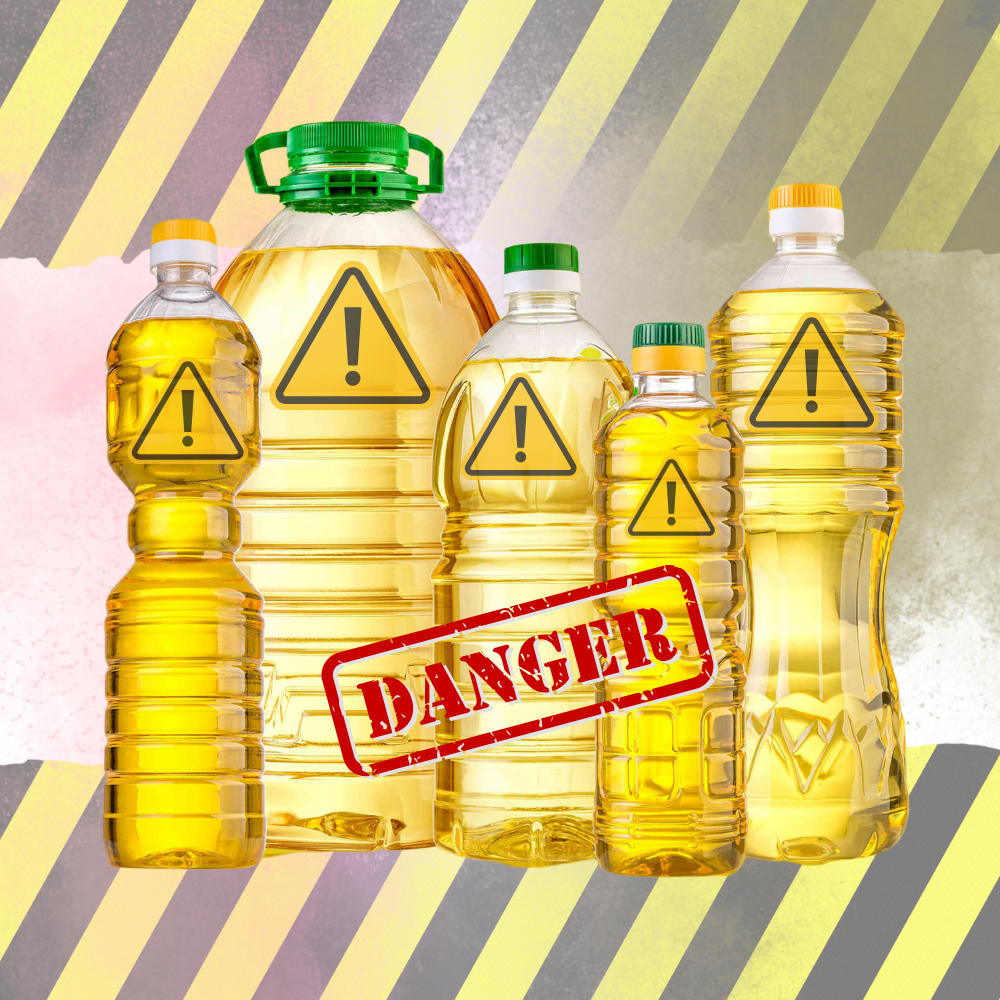
Ditch Seed Oils – Use Ghee Instead
Share
For decades, seed oils like canola, soybean, sunflower, and corn oil have been marketed as “heart-healthy” alternatives to traditional animal fats. However, modern research reveals that these highly processed oils are anything but healthy. They are linked to chronic inflammation, metabolic disorders, and numerous health issues. Let's contrast them with, ghee—a traditional clarified butter— which offers a nutrient-dense, stable, and health-supportive alternative.
Why Seed Oils Are Harmful
1. Highly Processed & Unstable
Seed oils go through industrial processing, involving high heat, chemical solvents (like hexane), and bleaching agents to extract oil from seeds. This damages their molecular structure, making them highly prone to oxidation. Once consumed, these oxidized fats create free radicals, which contribute to:
- Cell damage
- Premature aging
- Increased risk of cancer and chronic disease
(Tip.: Did You know that the oil you eat becomes a part of every cell membrane in Your body. If Your diet consisted of seed oils, it is the seed oils that became the part of Your cells and they will create oxidation for up to 7 years. If those cell membranes are exposed to sunlight, they are creating even more oxidative damage and can create cancerous waste around them.)
2. High in Inflammatory Omega-6 Fatty Acids
Omega-6 fatty acids are essential in small amounts, but excessive intake—especially when out of balance with omega-3s—fuels chronic inflammation. This inflammation is a root cause of many modern diseases, including:
- Heart disease
- Obesity
- Diabetes
- Autoimmune disorders
Most people today consume 20 times more omega-6 than omega-3, thanks to the widespread use of seed oils in processed foods. This imbalance disrupts normal metabolism and increases fat storage in the body.
3. Nutritionally Deficient
Seed oils provide no essential vitamins or minerals. Unlike natural fats like ghee, which are rich in fat-soluble vitamins (A, D, E, and K), seed oils are essentially empty calories that offer no real nourishment while promoting inflammation.
Why Ghee Is the Better Choice
Ghee has been used in Ayurvedic medicine and traditional cooking for centuries. Unlike seed oils, ghee is natural, highly stable, and packed with beneficial nutrients.
1. Rich in Nutrients
Ghee is a nutritional powerhouse, providing:
- Vitamin A – Supports eye health, immune function, and hormone balance.
- Vitamin D – Essential for calcium absorption, bone health, and immune function.
- Vitamin E – A powerful antioxidant that protects cells from damage.
- Vitamin K2 – Helps transport calcium to bones and teeth, preventing arterial calcification.
Unlike seed oils, which strip the body of nutrients, ghee actively supports cellular health and longevity.
2. Stable & Anti-Inflammatory
Ghee is predominantly saturated fat, meaning it is heat-stable and resistant to oxidation. This makes it one of the safest cooking fats because it:
- Doesn’t break down into toxic compounds when exposed to high heat.
- Has a high smoke point (252°C / 450°F), making it perfect for frying, roasting, and sautéing.
- Reduces inflammation, unlike seed oils, which fuel chronic inflammation in the body.
3. Supports Gut Health
Ghee is rich in butyrate, a short-chain fatty acid that helps:
- Heal the gut lining.
- Reduce inflammation in the digestive tract.
- Support healthy gut bacteria.
Many modern gut disorders, including leaky gut syndrome, IBS, and Crohn’s disease, are linked to chronic inflammation from poor-quality fats like seed oils. Ghee, on the other hand, soothes and restores gut health.
4. Lactose & Casein-Free
Unlike butter, ghee is free from lactose and casein, making it a great alternative for people with dairy sensitivities. Many who struggle with bloating or digestive issues after consuming dairy find that they can tolerate ghee without any problems.
5. Full of C15:0 (Pentadecanoic Acid)
C15:0 is a rare, odd-chain saturated fatty acid found in whole-fat dairy, fish, and grass-fed ghee. Recently recognized for its potential as an essential fat, C15:0 supports brain, heart, and metabolic health, reduces inflammation, and strengthens cells from the inside out.
-
Brain Health – Supports focus, mood, and memory
-
Heart Health – Improves cholesterol and lowers heart disease risk
-
Anti-Inflammatory – Helps reduce chronic inflammation
-
Cell Strength – Boosts mitochondrial function and cell resilience
-
Metabolic Support – Aids blood sugar balance and liver health
-
Immune Balance – Supports a healthy, stable immune system
How to Replace Seed Oils with Ghee
Making the switch is easier than you think:
- Use Ghee for Cooking – It’s perfect for frying, roasting, and sautéing. Simply replace vegetable oils 1:1 with ghee in your favorite recipes.
- Add Ghee to Coffee or Tea – Many people enjoy “bulletproof” coffee by blending ghee with coffee for a rich, creamy, energy-boosting drink.
- Drizzle Over Veggies or Meats – Melted ghee adds a delicious buttery flavor to roasted vegetables, grilled meats, or even popcorn.
- Check Ingredient Labels – Avoid processed foods containing “vegetable oil,” “canola oil,” “soybean oil,” or “sunflower oil.”
The Takeaway
Seed oils are among the most harmful dietary substances, promoting inflammation, oxidative stress, and nutrient deficiencies. Ghee, on the other hand, is a powerful, nutrient-dense alternative that supports overall health, gut function, and metabolic well-being.
By making the simple swap from seed oils to ghee, you’re not just upgrading your diet—you’re choosing long-term health and vitality.
